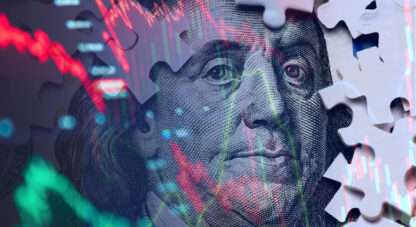The S&P500 rallied 45 points (2.2%) intraday on Federal Reserve Wednesday, to end the session with a 1.2% gain. The dollar index traded with an intraday range of 99.83 to 96.63, with bloody currency market chaos breaking out with the Fed statement release. EM currencies enjoyed huge rallies. The Russian ruble jumped 3.4% Wednesday, with the Hungarian forint gaining 2.8%, the Polish zloty 2.6%, the Mexican peso 1.9%, the Turkish lira 1.7%, the Colombian peso 1.2% and the Brazilian real 0.9%. After trading down to $42 Wednesday morning, WTI crude surged above $45 in the post-Fed melee. As with the currencies, most of the move came in three minutes. The Goldman Sachs Commodities Index spiked 3.6% on the Fed announcement.
A few notable post-Fed headlines: “Dollar Tumbles Most Since 2009 After Fed Cuts Rate Projections.” “Emerging Currencies Set for Biggest Weekly Rally in Year on Fed.” “Asian Currencies Advance Most This Week Since 2012 on Fed Signal.” “Asia Bond Risk Slides Most in Six Weeks After Fed Lowers Rate Forecast.” “Onshore Yuan Heads for Biggest Three-day Gain Since 2007.”
For the week, risk markets rallied sharply. The S&P500 gained 2.7%, back to within a percent of all-time highs. Not surprisingly, the more speculative segments of the marketplace enjoyed the strongest gains. The Nasdaq Composite rose 3.2%, trading Friday to the highest level since March 2000. The Nasdaq Transports jumped 5.8% and the Nasdaq Biotechs rose 6.2% this week. The NYSE Arca Biotechnology Index (BTK) surged 4.1%, increasing y-t-d gains to 23.3% and one-year gains to 51.6%.
March 19 – Bloomberg (Julie Verhage and Joseph Weisenthal): “Investors are kicking themselves if they listened to Fed Chair Janet Yellen and the Board of Governors last July and sold their biotech stocks. …The Nasdaq Biotech index is up well over 40% since Yellen’s valuation comments.”
It’s worth noting that the Biotechs have increased almost 200% since the Fed announced open-ended QE back in the late summer of 2012. The Semiconductors have doubled. The Nasdaq Composite has inflated 75% and the NDX (Nasdaq 100) almost 80%. The Dow Transports have gained 85%. The S&P500 has returned about 55%.
So why the panicked reaction in the currency markets to the Fed’s statement and chair Yellen’s press conference? Key market takeaways from the Fed statement: “export growth has weakened.” “Inflation has declined further below the Committee’s longer-run objective…” The statement also listed “readings on financial and international developments” as indicators the Fed will be assessing as it determines when to begin raising rates. “The Committee anticipates that it will be appropriate to raise the target range for the federal funds rate when it has seen further improvement in the labor market and is reasonably confident that inflation will move back to its 2% objective over the medium term.”
Yellen’s press conference underscored key points from the statement: “Compared with the projections made in December, most participants lowered their path to the federal funds rate consistent with the downward revisions made to the projections for GDP growth and inflation as well as somewhat lower estimates of the longer-run normal unemployment rate.” “We noted that export growth has weakened. Probably the strong dollar is one reason for that.” “So we are taking account of international developments, including prospects for growth in our trade partners in making the forecasts we have here.”
The markets went a little berserk. Importantly, the Yellen Fed signaled a concern for the strong dollar, along with market and international developments. A meaningful increase in rates will wait until the committee is more confident in achieving its 2% inflation rate target. With Fed attention now directed at the dollar, international fragilities and global disinflationary forces, market participants rest fully assured that the Fed has no intention of even timidly “leaning against the wind” of record securities prices, record corporate debt issuance and conspicuous market excess. Recently released Fed transcripts from the 2009 crisis-management period revealed vice chair Yellen as a notably assertive dove. Wednesday confirmed to the world that Yellen and the Yellen Fed are the most dovish chair and FOMC ever.
“Terminal Phase Excess” is fundamental to my Credit Bubble macro analytical framework. There reaches a momentum phase in prolonged Bubbles where systemic risks rise exponentially. Typically, there’s some combination of expanding quantities of riskier debt, market misperceptions and distortions, leveraged speculation, real and financial resource misallocation, and economic imbalances and deep structural maladjustment. Importantly, the increasingly conspicuous risk of a bursting Bubble ensures that policymakers err on the side of ongoing accommodation. Things really run amuck.
As I’ve written repeatedly, I’m convinced that the Fed’s extraordinary 2012 move to open-ended quantitative easing (QE) was in response to acute global financial fragilities. The U.S. unemployment rate was mere subterfuge. I – and clearly others – saw in this week’s Fed statement and Yellen’s comments an admission that the international backdrop now openly dictates Fed policymaking. In the Fed’s “surprising” Dovishness, I see confirmation of the global acute fragility thesis.
March 17 – Bloomberg (Margaret Collins): “Jeffrey Gundlach said if the Federal Reserve raises interest rates in the middle of 2015 the central bank will have to reverse course. The billionaire co-founder of DoubleLine Capital made the comments in an investor presentation… that covered bond markets, U.S. housing, global demographics and currencies. He criticized the Fed for not learning from errors made by global counterparts, which raised interest rates and then had to cut them, and Chair Janet Yellen for spending too much time with foreign officials. ‘The Fed is intent on being a blockhead,’ Gundlach said…”
March 17 – Bloomberg (Kelly Bit): “Ray Dalio, founder of the world’s largest hedge fund firm, Bridgewater Associates, told investors there’s a risk that the Federal Reserve could create a market rout similar to that of 1937 if it raises interest rates too fast… ‘We don’t know — nor does the Fed know — exactly how much tightening will knock over the apple cart,’ Dalio and Dinner wrote. ‘We think it would be best for the Fed to err on the side of being later and more delicate than normal.’”
Sometimes I feel as if I’m living on a different planet. As much as I respect the intelligence and market acumen of Jeffrey Gundlach and Ray Dalio, I take strong exception with some of their comments on Fed monetary policy. Dangerously flawed policymaking is only perpetuated by further delays in rate normalization. I also reject the comparison to 1937. Even at its 1937 highs, the Dow remained about half the 1929 peak. Unemployment sat above 14%. Today’s parallels are much closer to 1929. Regrettably, the Fed drew the wrong lessons from the “tech” and mortgage finance Bubble episodes. Now, everyone wants this party to last forever.
March 19 – Bloomberg (Jeff Kearns): “Federal Reserve Bank of Chicago President Charles Evans, who votes on policy this year, said in a research paper that interest rates should remain near zero for longer amid ‘substantial uncertainty’ about inflation and employment. ‘The biggest risk we face today is prematurely engineering restrictive monetary conditions,’ Evans wrote in a paper released Thursday that was co-written with reserve bank researchers Jonas Fisher, Francois Gourio and Spencer Krane. They said the risk of premature liftoff exceeds the risk of delaying too long, and that the central bank’s credibility will suffer if officials are forced to backtrack on policy. ‘It therefore seems prudent to refrain from raising rates until we are highly certain that the economy has achieved a sustained period of strong growth and that inflation is on a clear trajectory to return to target,’ Evans wrote…”
The belief that “the risk of premature liftoff exceeds the risk of delaying too long” is flawed and dangerous. I recall clearly a talk given by the astute Henry Kaufman back in September 1999. He explained how the Fed had missed it’s timing in tightening monetary policy. “And as in all things in life, if you miss your timing there are costs.” The Fed has really blown it this time. They blew it once again this week.
It’s now been almost two years since Bernanke’s talk of winding down QE and commencing a normalization of monetary policy. The Fed’s current focus should not be the dollar, CPI or even the employment rate. The primary consideration after six years of zero rates and $3.6 TN of monetization should be Financial Stability. The Fed needed to be prepared to counter securities market and speculative excesses. They have failed to do the obvious, and Wednesday’s meeting confirms they will remain firmly in Bubble accommodation mode.
I have argued for a number of years now that it was imperative for the Fed to begin extricating itself from market intervention and manipulation. It was never going to go smoothly, but when it comes to dealing with market distortions and Bubbles the earlier the better. The scope of the Bubble has now grown to unprecedented dimensions – throughout virtually all securities and asset markets – and it’s global: stocks – small caps, mid-caps, large-caps – risky and “defensive” – growth and income; bonds – sovereign, corporate, “developed” and “developing”; and all varieties of derivatives. Anything providing a yield.
The fundamental issue is a desperate need for the Fed to commence a process of normalizing the pricing of market risk. Savings needs to generate a positive real return. The enormous ongoing flow of (unsuspecting) savings into grossly inflated risk markets only exacerbates systemic risk. The Bubbling corporate debt market needs to be tested – and some market discipline reinstated. The ETF and “bond” fund complexes, recipients of Trillions of flows, need to be tested – and market discipline allowed to run its course. The self-reinforcing stock buybacks, M&A and other “financial engineering” need to be tested by a period of tighter finance and associated risk aversion. Will they stand up?
I am convinced the underlying finance driving the markets and, increasingly, the economic boom is unstable. I believe the best kept secret is that enormous amounts of global “hot money” are flooding into king dollar asset markets – U.S. stocks, bonds, real estate and business investment. It is an unsound dynamic and it’s unsustainable.
Over recent weeks the king dollar dynamic has turned increasingly destabilizing. EM currency and bond market contagions were gaining important momentum. Especially with Greece and Brazil facing serious issues, global Bubble markets were at heightened vulnerability to a surprising bout of speculative de-risking/de-leveraging. Policymakers responded, just as market operators have assumed – as they’ve done repeatedly. The ECB moved forward with QE. The Bank of Japan – along with Japanese financial institutions – have pushed forward with liquidity-boosting measures. Chinese fiscal and monetary measures have become more aggressive – including PBOC currency intervention. And this week the Fed showed its True Ultra-Dovishness.
The progression is now complete. Central bank market intervention moved from short-term interest rates, to long-term bond yields and the yield curve, to risk market prices more generally – to now wanton manipulation of the currency markets.
Long dollar, short EM, short crude and commodities trades had become crowded. This week the crowd was caught on the wrong side of a number of trades – and got slapped around a bit. Could the dollar have put in a short-term peak? It’s possible, but I don’t believe Fed talk can end the reign of king dollar.
Interest-rate differentials are important, and the Fed delaying its first rate increase provides help on the margin to the rapidly expanding list of troubled global borrowers. At the same time, aggressive Fed policymaking continues to provide a competitive advantage to U.S. risk markets at the expense of faltering EM. This is really the essence of king dollar – an inflating U.S. Bubble’s strangulation of deflating EM and commodities Bubbles.
There’s another problem that’s not going away anytime soon. Years of central bank market intervention, manipulation and monetization have cultivated a massive pool of global speculative finance. So long as global speculators were contently positioned leveraged long across global markets, there was the appearance of peace and prosperity for all. Those days are long gone.
The Yellen Fed inflicted some pain this week. And it was said that the People’s Bank of China intervened in the currency market to punish those shorting the renminbi. The upshot was a week of wild currency and commodities market volatility. It was a good week for EM – but it was also a good week for the U.S. Bubble. It was a notably unimpressive week for Brazil’s bonds and currency. It was as well an ominous week for Greece. Greece illustrates the disastrous consequences of having one’s debt discredited. Let’s hope the same fate does not await Brazil and many others.
The S&P500 jumped 2.7% (up 2.4% y-t-d), and the Dow gained 2.1% (up 1.7%). The Utilities rallied 3.8% (down 5.3%). The Banks increased 0.6% (down 0.5%), and the Broker/Dealers gained 1.4% (up 4.0%). The Transports advanced 2.3% (up 0.1%). The S&P 400 Midcaps jumped 3.3% (up 6.0%), and the small cap Russell 2000 rose 2.8% (up 5.1%). The Nasdaq100 advanced 3.3% (up 5.3%), and the Morgan Stanley High Tech index gained 2.7% (up 2.3%). The Semiconductors surged 3.3% (up 6.4%). The Biotechs jumped another 4.1% (up 23.3%). With bullion rallying $24, the HUI gold index recovered 5.7% (up 3.5%).
One- and three-month Treasury bill rates ended the week at zero. Two-year government yields dropped eight bps to 0.58% (down 8bps y-t-d). Five-year T-note yields sank 17 bps to 1.42% (down 24bps). Ten-year Treasury yields fell 18 bps to 1.93% (down 24bps). Long bond yields sank 19 bps to 2.51% (down 25bps). Benchmark Fannie MBS yields dropped 15 bps to 2.68% (down 15bps). The spread between benchmark MBS and 10-year Treasury yields widened three bps to 75 bps. The implied yield on December 2015 eurodollar futures fell 6.5 bps to 0.725%. Corporate bond spreads narrowed. An index of investment grade bond risk declined three bps to 63 bps. An index of junk bond risk sank 17 bps to 311 bps. An index of EM debt risk rose four bps to a one-month high 378 bps.
Greek 10-year yields jumped 57 bps to 11.18% (up 143bps y-t-d). Ten-year Portuguese yields increased eight bps to 1.62% (down 100bps). Italian 10-yr yields gained five bps to 1.20% (down 69bps). Spain’s 10-year yields increased three bps to 1.18% (down 44bps). German bund yields dropped seven bps to a record low 0.18% (down 36bps). French yields fell five bps to a record low 0.44% (down 39bps). The French to German 10-year bond spread widened two to 26 bps. U.K. 10-year gilt yields sank 19 bps to 1.52% (down 24bps).
Japan’s Nikkei equities index gained 1.6% to a new 15-year high (up 12.1% y-t-d). Japanese 10-year “JGB” yields fell eight bps to 0.32% (unchanged y-t-d). The German DAX equities index rose 1.2%, trading this week to another record high (up 22.8%). Trading to the high since 2010, Spain’s IBEX 35 equities index surged 3.5% (up 11.1%). Italy’s FTSE MIB index gained 2.0% to a five-year high (up 21.9%). Emerging equities were mostly higher. Brazil’s Bovespa index jumped 6.9% (up 3.9%). Mexico’s Bolsa was little changed (up 1.9%). South Korea’s Kospi index rose 2.6% (up 6.4%). India’s Sensex equities index declined 0.9% (up 2.8%). China’s Shanghai Exchange surged 7.3% to a six-year high (up 11.8%). Turkey’s Borsa Istanbul National 100 index advanced 7.7% (down 3.8%). Russia’s MICEX equities index was little changed (up 16.6%).
Debt issuance slowed. Investment-grade issuers included EMD $4.0bn, JPMorgan $3.75bn, Bank of America $1.75bn, Hyundai Capital America $1.0bn, Citigroup $1.0bn, ONEOK Partners LP $800 million, Oncor Electric Delivery $725 million, Masco $500 million, Liberty Property LP $400 million, Campbell Soup $300 million, RenaissanceRe Finance $300 million and Washington Prime Group LP $250 million
I saw no convertible debt issues this week.
Junk funds saw a second week of large outflows ($1.0bn from Lipper), as issuance dropped to the slowest pace since January. Junk issuers included Rite Aid $1.8bn, Infor $1.03bn and Vulcan Materials $400 million.
International debt issuers included Peru $2.55bn, Bank Nederlandse Gemeenten $2.0bn, APT Pipelines $1.4bn, Mizuho Bank $2.5bn, Inter-American Development Bank $850 million, Ecuador $750 million, Sensata Technologies $700 million, Virgin Media $500 million, Turk Hava Yollari $328 million and Merna Reinsurance $300 million.
Freddie Mac 30-year fixed mortgage rates dropped eight bps to 3.78% (down 9bps y-t-d). Fifteen-year rates declined four bps to 3.06% (down 9bps). One-year ARM rates were unchanged at 2.46% (up 6bps). Bankrate’s survey of jumbo mortgage borrowing costs had 30-yr fixed rates down five bps to 4.17% (down 11bps).
Federal Reserve Credit last week jumped $10.7bn to $4.461 TN. During the past year, Fed Credit inflated $287bn, or 6.9%. Fed Credit inflated $1.650 TN, or 59%, over the past 123 weeks. Elsewhere, Fed holdings for foreign owners of Treasury, Agency Debt last week dropped $24.5bn to a one-year low $3.223 TN. “Custody holdings” were down $70bn y-t-d.
M2 (narrow) “money” supply declined $21.8bn to $11.824 TN. “Narrow money” expanded $671bn, or 6.0%, over the past year. For the week, Currency was little changed. Total Checkable Deposits fell $19.2bn, while Savings Deposits gained $5.9bn. Small Time Deposits rose $5.5bn. Retail Money Funds declined $3.3bn.
Money market fund assets dropped $18.6bn to $2.672 TN. Money Funds were down $60.9bn year-to-date.
Total Commercial Paper increased $2.3bn to $1.025 TN. CP increased $6.1bn over the past year, or 0.6%.
Currency Watch:
March 20 – Reuters (Leika Kihara): “Bank of Japan Governor Haruhiko Kuroda on Friday dismissed views that the massive monetary stimulus programs deployed by advanced economies were triggering a ‘currency war’ of competitive exchange-rate devaluations. Central banks across the globe, including others in Asia like South Korea and India, have joined the ranks of Japan and the euro-zone in loosening monetary policies to spur sluggish growth. Kuroda said he did not see any sign of tension brewing between advanced and emerging economies on currency moves, shrugging off the view that countries are rushing to devalue their currencies to give their exports a competitive advantage. ‘I really don’t see any sort of currency war developing in the world now,’ Kuroda told a news conference at the Foreign Correspondents’ Club of Japan in Tokyo.”
March 20 – Financial Times (Gabriel Wildau): “Central bank intervention propelled the renminbi to its biggest weekly gain on record on Friday, as authorities sought to prevent recent currency weakness from eroding confidence in the economy and inciting capital flight. While intervention by the People’s Bank of China can never be directly confirmed, traders suspect the PBoC of drawing on its $3.8tn in foreign exchange reserves to support the renminbi in recent weeks… ‘The PBoC doesn’t want expectations of renminbi weakness to get too strong. That’s not good for the economy. So they want to keep the renminbi relatively stable,’ said a trader at a midsized bank in Shanghai.”
March 17 – Bloomberg (Belinda Cao and Fion Li): “Goldman Sachs Asset Management has been betting against the Chinese currency as a slowdown in the world’s second-largest economy spurs capital outflows. ‘We’ve been short the yuan for several months,’ Yacov Arnopolin, who helps oversee about $39 billion in emerging-market debt as a managing director at Goldman Sachs Asset, said… ‘It’s certainly difficult to continue the strengthening trend in the face of the slowing economy. It’s a challenging time.’ The yuan has fallen 0.4% against the greenback this year, following a 2.4% drop in 2014 that was the first annual decline in five years… The risk of the yuan weakening further and prompting more outflows makes it difficult for China to keep cutting interest rates to spur expansion. Premier Li told reporters… that policy makers will act if growth drifts toward the lower limit of its range and cuts into employment or wages.”
The U.S. dollar index was hit for 2.3% to 97.91 (up 8.5% y-t-d). For the week on the upside, the South African rand increased 3.8%, the New Zealand dollar 3.2%, the Danish krone 3.2%, the euro 3.1%, the Mexican peso 2.9%, the Norwegian krone 2.4%, the Canadian dollar 1.8%, the Australian dollar 1.8%, the British pound 1.4%, the Japanese yen 1.1%, the Swedish krona 1.1%, the Singapore dollar 1.0%, the Brazilian real 0.6%, the South Korean won 0.5% and the Taiwanese dollar 0.5%.
Commodities Watch:
March 18 – Reuters (Henning Gloystein): “A global oversupply of oil is set to rise as China pauses in the build-up of its strategic reserves and Asian refineries slow crude imports ahead of the spring maintenance season, putting more downward pressure on prices. China’s purchases to fill its strategic petroleum reserves (SPR) had been one of the main drivers of Asian demand since August of last year, with the No.2 oil consumer taking up cheap crude to fill its tanks despite slowing economic growth. Yet China could pause its reserve purchases soon as tank sites reach their limits and new space only becomes available later this year. Little is known about China’s SPR levels. The government seldom issues data, but its plan is to reach around 600 million barrels, about 90 days’ worth of imports. Most estimates put the SPR stocks currently to be 30-40 days’ worth. ‘I don’t think there is much (SPR) space left to fill,’ a Chinese storage executive said…”
The Goldman Sachs Commodities Index rallied 1.2% (down 4.8% y-t-d). Spot Gold jumped 2.1% to $1,183 (down 0.2%). May Silver surged 9.0% to $16.88 (up 8.2%). May Crude declined 49 cents to $46.57 (down 12%). April Gasoline gained 2.0% (up 22%), and April Natural Gas rose 2.2% (down 4%). May Copper rallied 3.7% (down 2%). May Wheat surged 5.6% (down 10%). May Corn gained 1.2% (down 3%).
U.S. Bubble Watch:
March 17 – Associated Press (Fenit Nirappil): “California residents have to turn off their sprinklers, and restaurants won’t give customers water unless they ask under new drought regulations approved Tuesday. The State Water Resources Control Board has extended and expanded restrictions on water use as California enters its fourth year of drought, and winter ends without significant storms or snowfall to replenish dwindling reservoirs. The drought’s effects are rippling across the state, hurting wildlife and forcing farmers to leave fields unplanted. So far this winter, wildfires are burning through nearly four times as many acres as usual. The state firefighting agency reports that the dry conditions are forcing it to maintain its highest-ever level of seasonal firefighters straight through the winter.”
March 19 – Bloomberg (Michelle Kaske): “Puerto Rico’s power utility is moving toward a record restructuring of its $8.6 billion debt load. For high-yield municipal investors, the move may be a trigger to add the junk-rated commonwealth’s bonds. The Electric Power Authority, called Prepa, is poised to reduce its obligations this year through negotiations with creditors. Such an agreement may cheapen Puerto Rico securities, which already trade at distressed levels, while clarifying how the commonwealth and its agencies may tackle $73 billion of debt, said John Miller, co-head of fixed income at Nuveen Asset Management.”
Fixed Income Bubble Watch:
March 19 – Wall Street Journal (Matt Wirz and Gillian Tan): “Citigroup Inc., Goldman Sachs Group Inc., UBS AG and other large banks face tens of millions of dollars in losses on loans they made to energy companies last year, a sign of investor jitters in a sector battered by the oil slump. The banks intended to sell the loans to investors but have struggled to unload them even after cutting prices…The losses mark a setback for Wall Street, after global banks earned $31 billion in fees over the past five years by financing energy-company stock sales, borrowing and mergers-and-acquisition transactions, according to Dealogic. Wall Street’s losses on the loans could have a chilling effect on some oil companies’ ability to fund their operations… Investment banks helped fuel the oil-and-gas exploration boom of the past decade by making loans valued at about $1 trillion to companies in the energy industry, most of which they sold to investors. The banks sold much of the debt to loan mutual funds, which grew rapidly from 2011 to 2013…”
March 17 – Bloomberg (Sridhar Natarajan and Elliott Stam): “Investors lured back into junk-rated energy bonds by their juicy yields are getting burned. Oil prices have fallen more than 15% since March 4 to a six-year low of $43.5, wiping out $7 billion of market value of high-yield debt issued by energy companies. Prices on $1.45 billion of notes sold less than two weeks ago by Energy XXI Ltd., an oil producer that was being squeezed by its lenders, have fallen by as much as 10%… The latest slump in crude is rekindling concern that oil companies will struggle to service the $120 billion of high-yield, high-risk debt they took on in the past three years amid the U.S. shale boom. That’s a sharp reversal from February when yield-starved bond investors were loading up on the debt again, pushing down borrowing costs to a two-month low. ‘We had a whole month where prices were at a level that it seemed to have bottomed and provided a false sense of security for investors,’ Jody Lurie… credit analyst at Janney Montgomery Scott LLC, said… ‘They are constantly hunting for yield and the short-term opportunity in this low-rate environment.’”
March 20 – Bloomberg (Cordell Eddings and Elliott Stam): “Junk-bond sales are on pace to be the most in six months as the Federal Reserve’s reduction of its forecast for interest rates encourages companies to borrow. Rite Aid Corp… and software maker Infor Inc., led companies selling $34.1 billion in speculative-grade debt securities in March, which is about $13.5 billion less than what was raised in September… Average yields on U.S. high yield bonds, currently at 6.62%, are below the 8.83% average of the last decade, according to Bank of America Merrill Lynch Index data.”
March 20 – Bloomberg (Ari Altstedter and Rebecca Penty): “A New York lawsuit is threatening to make Connacher Oil and Gas Ltd. a casualty of crude’s collapse in Canada’s oil sands as creditors squeeze small producers in one of the priciest places to extract the fuel. As oil prices resumed their slide to a new six-year low this week, creditors filed suit… demanding Connacher immediately repay a $128.4 million loan. If successful, the suit would make it difficult for the company to stay in business unless it finds some other source of capital, according to Moody’s… Connacher is among smaller oil-sands companies that drew interest from debt investors willing to finance upstart developments when U.S. crude prices averaged more than $90 a barrel. With prices now about half that, those so-called junior developers are fighting to stay afloat.”
March 18 – Financial Times (Vivianne Rodrigues): “There has been no sting in the tail for investors willing to bet on US high-yield bonds during 2015, with the market rebounding nicely from energy related jitters late last year. Whether the $1.3 TN US junk bond market can sustain such momentum depends on the path of Federal Reserve policy and oil prices, which fell to a six-year low this week and have depressed speculative-rated energy debt. From a broad perspective, alarm over the outlook for junk bonds at the start of the year has proven hollow. As the end of the first quarter looms, total returns are positive, new speculative grade rated bond sales… have jumped and investors have mostly returned to securities, pouring billions into funds and exchange traded funds investing on the debt for several consecutive weeks… Companies have taken notice of global investor appetite and have boosted sales of junk debt this year to $80.2bn, up 24% from the same period of 2014, according to Dealogic.”
March 18 – Wall Street Journal (Joe Light): “Mortgage-finance companies Fannie Mae and Freddie Mac could be at risk of needing more government bailouts, a watchdog said in a report set to be released Wednesday. The report from the inspector general for the Federal Housing Finance Agency, which regulates Fannie and Freddie, warns that the companies’ declining profits and capital cushions could leave them vulnerable in the event of an economic downturn. The U.S. government took over Fannie and Freddie in 2008, eventually injecting $187.5 billion in bailout money into the two. Since 2012, the companies have been highly profitable. By the end of March they will have repaid the U.S. Treasury more than $228 billion. But Fannie and Freddie last month reported weak earnings for the fourth quarter. Fannie recorded net income of $1.3 billion, compared with $6.5 billion in the same quarter a year earlier. Freddie posted a profit of $227 million, down from $8.6 billion.”
Federal Reserve Watch:
March 19 – Bloomberg (Cordell Eddings and Sridhar Natarajan): “Credit markets are getting a second wind, thanks to a Federal Reserve that’s suddenly not as confident the economy is strong enough to weather a steady rise in interest rates. Policy makers said on Wednesday they now expect the federal funds rate to end the year at 0.625%, down from their 1.125% forecast in December. The outlook for next year dropped to 1.875% from 2.5%. Bonds soared, with the yield on the 10-year Treasury note… plunging below 2% in its biggest decline in more than two months. ‘The party is still on,’ said Timothy Doubek, who helps manage $26 billion in company bonds… at Columbia Management Advisers… Prospects that the Fed may not be as aggressive as anticipated in raising rates may encourage investors to step back into the market. That’s good news for corporate borrowers, who issued an unprecedented $1.65 trillion in bonds last year in the U.S. at record low rates… Despite a recent fall off, sales this year are already up 12 % over the same period of 2014 to $437.9 billion.”
March 19 – Bloomberg (Julie Verhage and Joseph Weisenthal): “Investors are kicking themselves if they listened to Fed Chair Janet Yellen and the Board of Governors last July and sold their biotech stocks. As Bespoke Investment Group points out, the Nasdaq Biotech index is up well over 40% since Yellen’s valuation comments. Here is what the Fed said in its Monetary Policy Report on July 15: ‘Nevertheless, valuation metrics in some sectors do appear substantially stretched—particularly those for smaller firms in the social media and biotechnology industries, despite a notable downturn in equity prices for such firms early in the year. Moreover, implied volatility for the overall S&P 500 index, as calculated from option prices, has declined in recent months to low levels last recorded in the mid-1990s and mid-2000s, reflecting improved market sentiment and, perhaps, the influence of ‘reach for yield’ behavior by some investors.’”
March 19 – Bloomberg (Lisa Abramowicz): “If you listen to investing titans Jeffrey Gundlach and Ray Dalio, you’ll hear warnings of U.S. economic decline should the Federal Reserve hike interest rates too soon. If you give your ear to BlackRock Inc.’s Rick Rieder, you’ll get the opposite concern: The Fed isn’t raising borrowing costs quickly enough. ‘Keeping rates excessively accommodative almost certainly holds an increased risk for markets,’ Rieder, chief investment officer of fundamental fixed income at the world’s biggest money manager, said…’Fed policy today is penalizing savers and holders of cash’ and distorting asset prices. After more than six years of near-zero rates in the U.S., investors face a dilemma of whether to keep preparing for them to go up or to follow the masses into riskier and riskier securities just to get some yield.”
Central Bank Watch:
March 19 – New York Times (David Jolly): “The Swedish central bank… again cut its main interest rate, bringing it deeper into negative territory to head off deflationary pressures. The executive board of the Swedish Riksbank said that it had cut its main rate target by 0.15 percentage point to minus 0.25%, and that it would buy government bonds valued at 30 billion kronor, or about $3.5 billion, over the next few months.”
Global Bubble Watch:
March 20 – Wall Street Journal (Eleanor Warnock): “Three Japanese public pensions said Friday that they plan to shift more money into equities from domestic government bonds, following a similar move by the nation’s $1.1 trillion Government Pension Investment Fund. The three funds control a combined ¥30 trillion yen ($249bn), an amount roughly the size of Greece’s gross domestic product… The GPIF, the world’s largest pension fund, has been shifting assets to domestic and overseas equities since last year. Its reallocation—and expectations that other Japanese pension funds would follow suit—have helped push Tokyo’s Nikkei Stock Average to a 15-year high this week. The moves into riskier assets come at the urging of Prime Minister Shinzo Abe, who hopes to secure higher returns for pension funds faced with a rapidly aging population while helping to reinvigorate financial markets.”
March 20 – Bloomberg (Finbarr Flynn and Takako Taniguchi): “Mitsubishi UFJ Financial Group Inc. and Sumitomo Mitsui Financial Group Inc. drove record bond sales by Japanese issuers overseas this year, as domestic companies embarked on their largest global buying spree since 2012. Offerings abroad totaled $22.1 billion this quarter, up 63% from the first three months of last year and the most dating back to 1980… Mitsubishi UFJ, whose overseas loans rose 79% to 39.2 trillion yen ($325bn) in the two-year period to 2014, sold $3 billion in bonds Feb. 25… Japanese companies have announced $39 billion on overseas acquisitions so far this year, on track for the biggest quarterly total since the last three months of 2012…”
March 18 – Financial Times (Ralph Atkins and Neil Hume): “Decisions taken by only a few big fund managers could determine how well bond markets function in future crises, researchers at the Bank for International Settlements have warned. Worries about bond market liquidity… have intensified as low interest rates have pushed yield-hunting investors into riskier assets. A ‘flash crash’ in US Treasury yields in a matter of minutes in October raised fears that even the massive market for US debt could be hit.’ ‘What happens in financial markets does not always stay in financial markets, and we would do well to be on the lookout for any potential economic impact from financial market disruptions,’ said Hyun Shin, head of research at BIS. But the BIS report also highlights the possible dangers of an increasing concentration within bond markets, with a few large asset managers becoming dominant. ‘Market liquidity may increasingly come to depend on the portfolio allocation decisions of only a few large institutions,’ the BIS authors conclude.”
March 17 – Bloomberg (David McLaughlin and Tom Schoenberg): “U.S. prosecutors investigating currency manipulation are considering revoking years-old settlements and prosecuting banks for rigging interest rates…The Justice Department is weighing whether evidence of wrongdoing in currency trading means banks violated old deals resolving probes into the rigging of benchmark interest rates, said two people, who asked not to be identified… The Justice Department can tear up the deals and charge the banks if it finds they committed any crime after they were negotiated.”
ECB Watch:
March 17 – Reuters: “European Central Bank bond-buying will cause problems in securitised lending markets over time if no action is taken to free up collateral, a senior official from trade body ICMA said… It is concerned that the ECB’s quantitative easing programme will compound the impact on liquidity in bond and securities repurchase or repo markets of pending regulation intended to insure against a breakdown of market infrastructure. Some market participants say QE, launched last week, is already distorting the repo market, where securities such as government bonds are exchanged for short-term cash. ‘There’s no doubt in our mind that QE is another factor which further increases the pressure on collateral because it’s taking securities out of the collateral market,’ said David Hiscock, ICMA’s senior director, market practice and regulatory policy. ‘The effect of that is one which will grow over time as ECB QE proceeds.’”
Europe Watch:
March 20 – Financial Times (Peter Spiegel): “Greece’s prime minister and fellow eurozone leaders emerged from a meeting early on Friday morning touting a breakthrough agreement to unlock much-needed bailout funds for Athens — only to fall into disagreement hours later about what it all meant. Two days of intensive and occasionally heated negotiations at an EU summit in Brussels amounted to little more than a repeat of talks a month ago between eurozone finance ministers that officials then also hailed as the definitive agreement to get the final bailout review under way. So similar were the two deals that, much like the one finalised last month, leaders involved in the talks could not agree on what was agreed within 12 hours after a late-night meeting aimed at resolving all differences. Athens is facing a severe cash crunch. It needs fresh sources of financing to pay wages and pensions at the end of this month following a €1bn revenue shortfall in the first two months of the year, according to Athens bankers.”
March 19 – Bloomberg (Marcus Bensasson and Nikos Chrysoloras): “With Greece’s coffers emptying and payments looming, Prime Minister Alexis Tsipras’s government is coming ever closer to a financial day of reckoning. While Tsipras may have bought some time after yesterday’s European Union summit in Brussels, he still isn’t saying what’s left in the bank and acknowledges Greece is facing ‘liquidity pressure.’ The country’s cash shortfall is projected to hit 3.5 billion euros ($3.7bn) in March… As time runs out and Tsipras prepares for another meeting with German Chancellor Angela Merkel in Berlin on Monday, Greek bonds slightly recovered today… The yield on three-year bonds fell 50 bps to 23.25% at 10:46 a.m. in Athens on Friday, after reaching yesterday the highest level since July, when the notes were first issued.”
March 17 – Bloomberg (Ben Sills, Corina Ruhe and Marcus Bensasson): “Dutch Finance Minister Jeroen Dijsselbloem raised the possibility of using capital controls to prevent Greece from leaving the euro, the most explicit mention of that option to date by a top European policy maker. Dijsselbloem, who heads the group of euro area finance ministers, told BNR Nieuwsradio… that the 2013 Cypriot bailout shows temporarily shutting banks and restricting the flow of capital could stabilize Greece’s financial system and allow it to remain part of the currency union. ‘It’s been explored what should happen if a country gets into deep trouble — that doesn’t immediately have to be an exit scenario,’ he said. For Cyprus, ‘we had to take radical measures, banks were closed for a while and capital flows within and out of the country were tied to all kinds of conditions, but you can think of all kinds of scenarios.’”
March 17 – Reuters: “Greece frustrated its main creditors on Tuesday by refusing to update euro zone peers on its reform progress at a scheduled teleconference, insisting instead that the discussions should be escalated to Thursday’s European Union summit. Describing the annoyance that has been building up among euro zone countries with the new Greek government’s approach, one euro zone official said: ‘For many people the teleconference this afternoon could be something of a last straw.’ Euro zone deputy finance ministers held a teleconference at 1530 GMT to get an ‘update on the state of play’ on Greece, which is running out of cash and time to negotiate and implement reforms that would unblock loans to prevent it from defaulting. But three sources with knowledge of the call said that, instead of an update, a Greek official had said these issues would be discussed by Prime Minister Alexis Tsipras at the EU leaders meeting in Brussels… Two sources said that one of the officials on the call, which the sources described as short, said following the Greek refusal to update that the creditors were ‘riding a dead horse’, suggesting the talks were getting nowhere.”
March 15 – Bloomberg (Dalia Fahmy and Elisabeth Behrmann): “Berlin cabdriver Jens Mueller says he’s had it with the Greek government and he doesn’t want Germany to send any more of his tax money to be squandered in Athens. ‘They’ve got a lot of hubris and arrogance, being in the situation they’re in and making all these demands,’ said Mueller… ‘Maybe it’s better for Greece to just leave the euro.’ Mueller’s sentiment is shared by a majority of Germans. A poll published March 13 by public broadcaster ZDF found 52% of his countrymen no longer want Greece to remain in Europe’s common currency, up from 41% last month. The shift is due to a view held by 80% of Germans that Greece’s government ‘isn’t behaving seriously toward its European partners.’ The hardening of German opinion is significant because the country is the biggest contributor to Greece’s 240 billion-euro ($253bn) twin bailouts and the chief proponent of budget cuts and reforms in return for aid.”
China Bubble Watch:
March 17 – Reuters (Clare Jim): “China’s average new home prices fell at the fastest pace on record in February from a year earlier, hurt by slower sales during the Lunar New Year holidays… Average new home prices in China’s 70 major cities dropped 5.7% last month from a year ago, the sixth consecutive fall, following January’s 5.1% decline. It was the biggest annual decline in the nationwide survey since it began in 2011. The monthly fall in February from January was 0.4%, the same as in the previous month… The record fall coincided with news that Chinese banks have extended Evergrande Real Estate Group 100 billion yuan ($16bn) in credit, as the real estate slump extends to one of the country’s biggest and most indebted property developers.”
March 18 – Reuters (Nathaniel Taplin and Engen Tham): “China’s trust firms, with total assets of $2.2 trillion, are shifting more cash into frothy capital markets and over-the-counter (OTC) instruments instead of loans – blunting regulators’ efforts to reduce shadow banking risk. By redirecting money into capital markets and OTC products like asset-backed securities (ABS) and bankers’ acceptances, trusts are acting less like lenders and more like hedge funds or lightly regulated mutual funds. And the shift – a response to a clampdown last year on trust lending to risky real estate and industrial projects – means a significant chunk of shadow banking risk is migrating rather than shrinking. China trusts take in funds from retail and institutional investors and re-lend or reinvest that money, often in parts of the economy that struggle to obtain bank credit… Previously, people who bought into opaque wealth management products, many of which were peddled by banks but actually backed by trust assets, found themselves heavily exposed to real estate loans… A Reuters analysis of China Trust Association data shows that while loans outstanding grew just 8% last year – far below the 62% growth in 2013 – growth in obscure asset categories including ‘tradable financial assets’ and ‘saleable fixed-term investments’ was 77% and 47%, respectively… An individual at one of China’s top three trusts said that in the past year his firm’s investment in shares and bonds grew 30-40% and 50%, respectively – helping explain where some of the leverage that has driven recent Chinese stock and fixed income market rallies has come from…While overall shadow finance growth slowed to 43% last year… this ‘leakage’ from one kind of shadow financing to another reduces the impact of the regulatory crackdown on the sector.”
March 19 – Bloomberg (Justina Lee): “China’s money-market funds are taking more risks to boost returns as the central bank cuts interest rates, prompting Fitch… to warn of the threat of contagion. Alibaba Group Holding’s Yu’EBao, China’s largest money-market fund, extended its weighted-average maturity to 93 days at the end of last year, doubling from 44 days in September 2013… Buying longer-dated assets while promising investors instant redemption creates a maturity mismatch that risks infecting the wider financial system, said Fitch analyst Li Huang. Chinese money-market fund assets surged threefold last year to 2.2 trillion yuan ($356bn) as high interbank rates helped deliver returns two times that of the official deposit rate.”
March 19 – Bloomberg (Lianting Tu): “A steering committee representing Kaisa Group Holdings Ltd.’s offshore bondholders won’t agree to the company’s proposed debt restructuring by Friday’s early bird deadline. ‘We are working with the company to agree an acceptable and realistic timeline and process so that we can obtain for you a sensible revised proposal,’ Kirkland & Ellis LLP, the law firm representing some of Kaisa’s creditors, said… Kaisa said last week offshore creditors stand to recover just 2.4% of their money in a liquidation, and proposed a debt rejig that would cut coupons and defer payment obligations by up to five years.”
Geopolitical Watch:
March 17 – Reuters (Matthias Sobolewski and Jason Lange): “The United States has urged countries to think twice before signing up to a new China-led Asian development bank that Washington sees as a rival to the World Bank, after Germany, France and Italy followed Britain in saying they would join. The concerted move by U.S. allies to participate in Beijing’s flagship economic outreach project is a diplomatic blow to the United States and its efforts to counter the fast-growing economic and diplomatic influence of China. Europe’s participation reflects the eagerness to partner with China’s economy, the world’s second largest, and comes amid prickly trade negotiations between Brussels and Washington. European Union and Asian governments are frustrated that the U.S. Congress has held up a reform of voting rights in the International Monetary Fund that would give China and other emerging powers more say in global economic governance.”
March 18 – Washington Post (Simon Denyer): “China’s state media indulged in a bit of gloating Wednesday, as Europe’s most powerful nations announced they planned to join a Chinese-led Asian regional bank, ignoring objections from the United States. In a commentary piece titled ‘Washington, what are you waiting for?’ state news agency Xinhua described the United States as ‘petulant and cynical’ for declining to join the Asian Infrastructure Investment Bank (AIIB). It said the bank was open to all nations but said Washington’s ‘sour grapes’ left it looking ‘isolated and hypocritical.’ On Tuesday, Germany, France and Italy said they planned to join the bank, following Britain’s decision to do so last week…The United States was sharply critical of Britain’s decision last week, with an unnamed administration official telling the Financial Times that it had been made with ‘virtually no consultation with the U.S.’ and accusing London of ‘constant accommodation’ of China.”
March 17 – BBC: “Greek Prime Minister Alexis Tsipras is to visit Russian President Vladimir Putin on 8 April, a month earlier than planned, as the indebted eurozone member state seeks to avoid bankruptcy. He came to power vowing to end austerity, but talks with creditors on Greek financial reforms are in trouble. Relations with one of Greece’s biggest creditors, Germany, are at a low ebb.”
Brazil Watch:
March 18 – Reuters (Alonso Soto and Luciana Otoni): “The Brazilian central bank has little room to continue with its currency swap program because it is running out of ammunition to counter a weakening real, a senior government official told Reuters… ‘They (at the bank) don’t have many options to continue with the swaps policy for very long,’ said the official. He added that the bank has already sold the equivalent of 40% of its foreign reserves, which is weighing on its credibility with the market to continue effectively battling a weaker real. The swap program, which started in August 2013, is scheduled to end on March 31, but investors believe the central bank could opt to again reduce the scope of the program in a new extension. The central bank chief, Alexandre Tombini, said… that the swap program has a ‘significant size,’ hinting that the daily sale of swaps could be reduced or even halted.”
March 19 – Bloomberg (Filipe Pacheco and Gerson Freitas Jr): “The staggering reach of Petroleo Brasileiro SA’s corruption scandal is getting even bigger. Braskem SA, Latin America’s biggest petrochemicals maker by sales, became the latest company implicated in testimony alleging it paid bribes to the state-controlled oil producer in return for contracts. While Braskem denied the accusations, its $750 million of bonds due 2024 plummeted 7.9% last week, the most among high-grade emerging-market debt. The allegations against Braskem underscore how pervasive the alleged kickbacks were in Brazil, where more than a million people took to the streets over the weekend to protest corruption. The federal investigation has already embroiled the nation’s biggest builders and rig makers while fueling losses in the bonds of banks, the government and even a state pension fund. ‘The whole scandal is damaging more and more Brazilian companies from all segments, and Braskem can be seen as the latest example,’ Leonardo Kestelman, a money manager at Dinosaur Securities, said… ‘People just prefer to hit the sell button instead of waiting.”
March 18 – Reuters (Anthony Boadle): “Brazil’s Comptroller-General Office… added another six construction and engineering firms to an investigation of contractors that allegedly participated in a corruption ring at state-run oil company Petrobras… A total of 24 of Brazil’s top builders are being investigated for suspected overpricing of contracts in a multibillion-dollar scheme that funneled bribes to Petrobras executives and politicians. The case may exclude the companies from new contracts with Petroleo Brasileiro… and lead to fines and other penalties. Brazil’s biggest-ever corruption scandal is rippling through various sectors of Brazil’s economy. Large infrastructure projects will likely be stalled with so many engineering firms under investigation. The investigation has so far led to 20 indictments of 103 people on racketeering, bribery and money laundering charges, including three former Petrobras senior managers and executives from Brazil’s leading construction and engineering firms.”
March 17 – Bloomberg (David Biller): “Finance Minister Joaquim Levy’s attempt to restore investor confidence in Brazil is being undermined by deepening political turmoil and public dissatisfaction. Traders pushed up the cost to insure the nation’s debt to an almost six-year high on Monday, one day after more than a million Brazilians took the streets to protest government corruption, higher taxes and President Dilma Rousseff’s handling of the economy. The credit-default swaps have risen faster this year than those for Russia, India and China, the three others that make up the BRIC group of nations. With the economy on the brink of its deepest recession in a quarter-century, a growing chorus of lawmakers and citizens has come out in opposition of austerity measures that Levy says are needed to keep Brazil from losing its investment grade. O Estado de S. Paulo reported last week he threatened to quit, which rattled traders across all assets and deepened selloffs in Brazil’s debt, equities and currency. ‘We’re in a fragile moment,’ Joao Junior, a fixed-income trader at ICAP Brasil, said… The pushback that he’s facing ‘will generate stress in the market.’”
March 17 – Reuters (Caroline Stauffer): “Brazil’s main opposition party said…it would call on the Supreme Court to investigate President Dilma Rousseff’s involvement in a corruption scheme at state-run oil firm Petroleo Brasileiro SA. The motion comes a day after prosecutors charged the treasurer of Rousseff’s Workers’ Party, Joao Vaccari, with corruption and money laundering… Rousseff has denied knowing about corruption at Petrobras as chairwoman of its board from 2003 to 2010 when much of the alleged graft occurred and has urged a thorough investigation. She is facing a growing wave of anger over the scandal, however. Some 1 million people protested in two dozen cities on Sunday, many calling for her impeachment.”
EM Bubble Watch:
March 17 – Bloomberg (Christopher Langner and Anto Antony): “Indian banks may rein in lending growth already near the slowest pace in five years after regulators ordered them to set aside more funds to counter bad debt. From 1 April, lenders will have to lift capital levels to cover 15% of restructured loans in arrears, up from 5%. That’s going to increase banks’ liabilities and reduce their reserve buffers, the three main rating companies say. Banks that are more cautious on lending are failing to pass on interest rate cuts, holding back Prime Minister Narendra Modi’s efforts to achieve growth as high as 8.5% next fiscal year. Distressed loans soared to a record Rs4.2 trillion ($67bn) in December, 6.2% of total advances… The quality of banks’ assets ‘has been weak and that’s weighing on their capital position,’ Geeta Chugh, an analyst at Standard & Poor’s…said… ‘Many will need to sell more Tier 1 securities if they’re to increase lending.’”
March 19 – Bloomberg (Paul Wallace): “Nigeria’s credit rating was downgraded by Standard & Poor’s… because of falling oil prices and rising political risks before delayed elections due next week in the West African country… ‘The decline in oil prices in the last seven months has significantly affected Nigeria’s external position and external vulnerability,’ S&P said… ‘The tightly contested general elections may pose risks to Nigeria’s external position and the implementation of what we view as the government’s ambitious fiscal consolidation plans, while the Boko Haram group continues to disrupt the northeast.’ Africa’s largest economy, which derives 90% of export earnings and 70% of government revenue from oil, is struggling with Brent crude prices having halved since June.”
March 19 – Bloomberg (Lianting Tu): “The freefall in oil already had Pacific Rubiales Energy Corp. bondholders on edge. Now, the Colombian oil producer is going to lose its biggest field. The company’s $1.3 billion of notes due 2019 have plunged 17% since March 12, the day before Pacific Rubiales said its contract to operate Colombia’s largest oil field won’t be extended. The drop, the biggest in emerging markets, has pushed the notes deeper into distressed territory as yields rose to a record 17.76 percentage points more than U.S. Treasuries… The producer, which more than tripled its debt since the end of 2012, reported a record quarterly loss of $1.66 billion Wednesday and suspended its dividend to save cash.”
Russia and Ukraine Watch:
March 19 – Bloomberg (Krystof Chamonikolas): “Ukraine’s plummeting bond prices are signaling that creditors including Franklin Templeton face steep writedowns in the nation’s foreign debt restructuring. The country’s $2.6 billion of notes due July 2017 fell to a record 39.3 cents on the dollar on Thursday… Current prices are consistent with about a 20% cut in the principal and a 50% reduction in coupon payments, according to Vadim Khramov, a Bank of America Corp. strategist in London.”
Japan Watch:
March 17 – Bloomberg (Kevin Buckland and Shigeki Nozawa): “Japan’s public pension funds, which include the world’s biggest, accelerated their push to dump local bonds and invest the money abroad to a record pace. The $1.1 trillion Government Pension Investment Fund and its smaller peers almost doubled net sales of Japanese government bonds to 5.56 trillion yen ($46bn) in the fourth quarter, the most in Bank of Japan figures dating back to 1998. They bought an unprecedented 2.39 trillion yen of foreign stocks and bonds. Selling of JGBs and buying of overseas securities has continued for six straight quarters. GPIF posted its largest investment gain in almost two years last quarter after shifting more money into stocks from Japanese bonds, as it came under government pressure to boost returns to cover payouts for the world’s fastest-aging population.”














